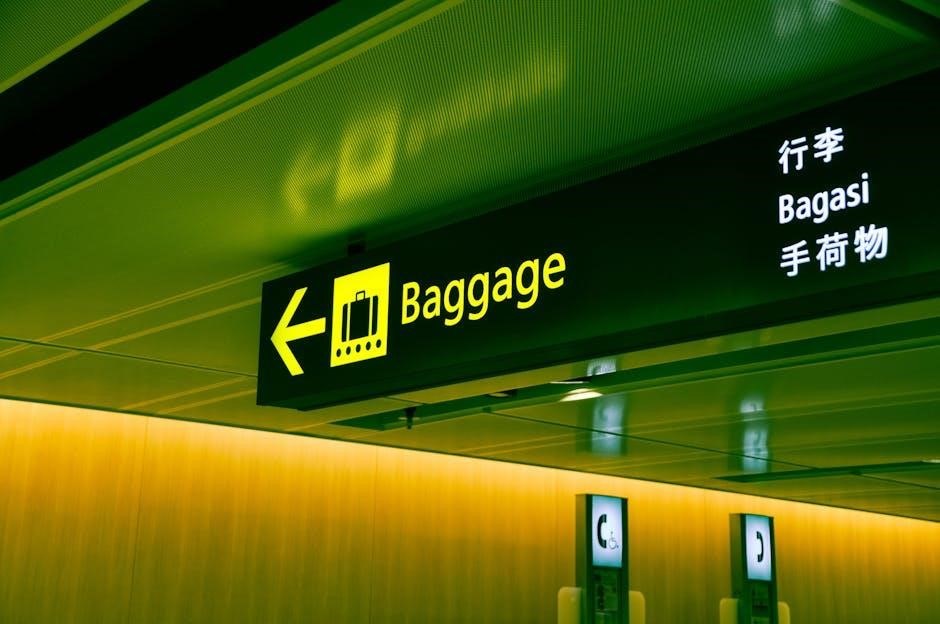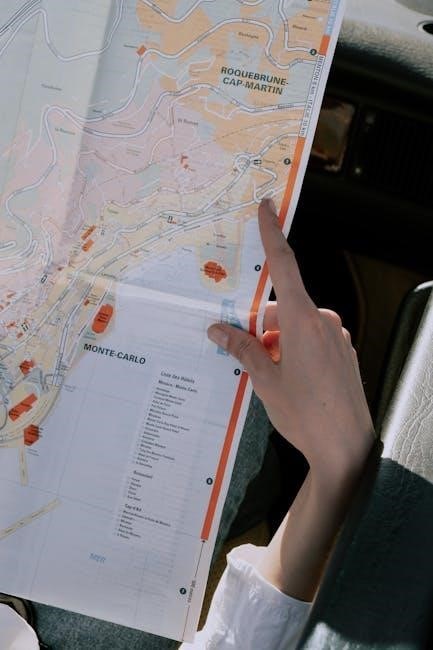
The AZ Voter Guide, created by Clean Elections, provides official, nonpartisan voting information to empower Arizona voters with essential details on registration, deadlines, candidates, and polling locations․
1․1 Purpose of the Guide
The AZ Voter Guide aims to empower Arizona voters by providing clear, nonpartisan information to help them make informed decisions․ Created by Clean Elections, this resource ensures voters understand their rights, registration processes, and election details․ It serves as a trusted tool to enhance voter confidence and participation, offering comprehensive yet concise guidance for all Arizona residents․
1․2 Importance of Voter Education
Voter education is crucial for ensuring informed participation in Arizona’s elections․ By understanding registration processes, ballot content, and voting options, citizens can confidently exercise their right to vote․ Education fosters engagement, reduces confusion, and strengthens the democratic process, ensuring every Arizonan’s voice is heard effectively․
Voter Registration in Arizona
Arizona offers multiple voter registration methods, including online, mail, and in-person options, ensuring accessibility for all eligible citizens to participate in elections effectively․
2․1 Eligibility Requirements
To register in Arizona, you must be a U․S․ citizen, at least 18 years old by Election Day, and a state resident․ Felons must have completed their sentence, including parole and probation․ Additionally, you cannot be declared mentally incapacitated by a court․ Meeting these requirements ensures eligibility to cast a ballot in Arizona elections․
2;2 Registration Deadlines
Arizona requires voter registration by the 29th day before Election Day․ For the November 2024 election, the deadline is October 10, 2024․ Registration can be completed online, by mail, or in-person․ Early voting begins on October 23, 2024, and mail-in ballots are sent starting October 9, 2024․ Ensure timely registration to participate in all elections, including primaries and general elections․
2․3 Methods of Registration
Arizona offers multiple registration methods for voter convenience․ Online registration is available through the Arizona Secretary of State’s website․ Voters can also register by mail using a printable form or in-person at county recorder offices․ Additionally, registration is accessible at public libraries and community centers․ These methods ensure all eligible citizens can easily register to vote․
2․4 Verification Process
After submitting a registration application, Arizona’s system verifies eligibility, checks identification, and updates voter rolls․ If issues arise, voters are contacted for additional information․ This ensures accurate and secure voter registration, maintaining the integrity of the electoral process while protecting voter rights and access to participation in elections․

Key Dates and Deadlines
Arizona’s early voting begins in late October, with mail-in ballot requests due by early October and Election Day falling on the first Tuesday in November 2024․
3․1 Early Voting Period
Arizona’s early voting period typically begins in late October and runs through the Friday before Election Day․ During this time, voters can cast ballots in person at designated early voting locations or by mail․ This convenient option allows residents to avoid Election Day lines and ensures flexibility for those with scheduling conflicts․
3․2 Mail-In Ballot Request Deadline
The deadline to request a mail-in ballot in Arizona is typically 11 days before Election Day․ Voters can submit requests online, by mail, or in person․ Ensuring timely submission is crucial to receive ballots and return them by the deadline, usually on Election Day, to be counted in the final results․
3․3 Election Day
Election Day is the final opportunity to cast ballots, typically held on the first Tuesday after the first Monday in November․ Polling stations open from 6 a․m․ to 7 p․m․ in Arizona․ Voters must present valid ID and be in line by 7 p․m․ to ensure their vote is counted․ This day marks the culmination of the electoral process, determining local, state, and federal representatives․

Early Voting Options
Early voting in Arizona offers flexibility with in-person locations and mail-in ballots, allowing voters to cast ballots before Election Day conveniently․
4․1 In-Person Early Voting Locations
In Arizona, early voting locations are open 26 days before Election Day․ Voters can cast ballots in person at designated sites, which are listed on the Arizona Secretary of State’s website or through local county recorders․ These locations provide accessible voting machines and ensure compliance with voter ID laws, making the process convenient and secure for all eligible voters․
4․2 Mail-In Ballot Process
Arizona offers mail-in ballots for registered voters, allowing them to cast votes from home․ The process involves requesting a ballot by the deadline, filling it out, signing the affidavit envelope, and mailing it back․ Voters can track their ballot status online to ensure it’s received and counted, providing a convenient and secure alternative to in-person voting․

Understanding the Ballot
The ballot outlines candidates, propositions, and local measures, allowing voters to make informed decisions․ Voters can leave sections blank, as partial ballots are still counted․
5․1 Types of Elections
In Arizona, elections include federal, state, and local races, as well as primary and special elections․ Voters may also decide on ballot measures and propositions․ Ranked-choice voting systems are not typically used in Arizona elections․ Understanding the types of elections helps voters prepare for the issues and candidates they will encounter on the ballot․
5․2 Candidate Information
Candidate information in the AZ Voter Guide includes biographies, party affiliations, and positions on key issues․ Voters can learn about candidates’ backgrounds, experience, and platforms to make informed decisions․ The guide also provides details on judicial candidates and their performance reviews, helping Arizonans understand who is running and what they stand for․
5․3 Ballot Measures and Propositions
The AZ Voter Guide explains ballot measures and propositions, detailing their purpose and potential impact․ It outlines types, such as initiatives and referendums, and provides summaries, fiscal analyses, and arguments for and against each․ This helps voters understand how their decisions will shape Arizona’s laws, from education to healthcare, ensuring informed choices at the polls․

Voting Requirements and ID Laws
Arizona requires voters to present valid ID at polls or when mailing ballots․ Accepted forms include driver’s licenses, passports, and tribal IDs, ensuring secure and verified voting processes․
6․1 Accepted Forms of Identification
Arizona voters must present valid identification at polling stations or when submitting mail-in ballots․ Accepted forms include a driver’s license, state ID, passport, military ID, or tribal ID․ Photocopies are also permitted if they are legible and valid․ Additionally, a utility bill, bank statement, or government document with the voter’s name and address can serve as secondary verification․ Ensuring proper ID helps maintain election integrity and security, preventing unauthorized voting while safeguarding the rights of eligible voters to participate in the democratic process․ This requirement applies uniformly across all counties and voting methods, providing consistency for voters statewide․
6․2 Rights of Voters with Disabilities
Arizona ensures accessible voting for individuals with disabilities, guaranteeing their right to vote independently and privately․ Polling stations are required to be accessible, with features like ramps, large print materials, and audio ballots․ Voters with disabilities can also request assistance from poll workers or bring a trusted helper․ Additionally, mail-in ballots provide an alternative for those who prefer to vote from home, ensuring inclusivity and equal participation in elections for all eligible voters․ These accommodations are designed to remove barriers and uphold the principle of equal access to the ballot box, reflecting Arizona’s commitment to an inclusive democratic process․ By providing these resources, the state ensures that every voter, regardless of ability, can exercise their right to vote without unnecessary challenges or obstacles, promoting a fair and representative election system․

Tracking Your Ballot
Arizona provides online tools to track your ballot status, ensuring transparency and peace of mind․ Verify your ballot’s progress and resolve any issues promptly to ensure it’s counted․
7․1 Ballot Status Verification
Arizona voters can verify their ballot status online through the Secretary of State’s portal or their county recorder’s website; This system allows tracking of mail-in ballots, ensuring voters know when their ballot is received and counted․ Additionally, voters receive confirmation emails or texts upon successful processing, providing reassurance about their vote’s status and security․
7․2 Resolving Issues with Your Ballot
If issues arise with your ballot, contact your local election office immediately․ Voters can correct signature discrepancies or resolve mailing errors by submitting a replacement ballot or casting a provisional ballot on Election Day․ Arizona’s election officials ensure every valid vote is counted, addressing concerns promptly to maintain voter confidence and election integrity․
Get Out the Vote Campaigns
Get Out the Vote campaigns focus on strategies for voter engagement and community outreach programs to educate and motivate residents, strengthening democratic participation and civic involvement․
8․1 Strategies for Voter Engagement
Effective voter engagement strategies include organizing community events, leveraging social media campaigns, and partnering with local organizations to educate voters․ These efforts aim to build awareness and encourage participation, ensuring all eligible voters have the resources and motivation to cast their ballots․ Outreach programs often target underrepresented groups to foster a more inclusive democratic process․
8․2 Community Outreach Programs
Community outreach programs play a vital role in voter engagement by connecting directly with residents through workshops, door-to-door campaigns, and cultural events․ These initiatives often provide voter registration assistance, distribute educational materials, and address specific concerns within neighborhoods․ By fostering trust and accessibility, these programs help ensure that all community members are informed and prepared to participate in elections․

Election Day Resources
Election Day resources ensure voters are prepared with polling station locations, required ID, and accessible voting options․ Utilize online tools to confirm your polling place and verify requirements․
9․1 Polling Station Locations
Arizona voters can easily find their assigned polling stations using online tools provided by local election officials․ These resources allow voters to search by address, ensuring they know where to cast their ballots on Election Day․ Additionally, many counties offer mobile apps and interactive maps to help locate polling stations efficiently and accurately․
9․2 What to Bring to the Polls
Voters should bring a valid form of identification, such as a driver’s license, passport, or state ID, to verify their identity․ It’s also helpful to bring a sample ballot or list of candidates marked with preferences to expedite the voting process․ Additionally, voters with disabilities may need to bring assistive devices, and those with recent address or name changes should bring updated documentation for verification․

Election Security and Integrity
Mail ballots are securely counted if they meet eligibility and validity requirements, ensuring the integrity of the electoral process through verification and tracking tools․
10․1 Measures to Ensure Secure Voting
Arizona employs robust security measures, including mail ballot verification, tracking systems, and secure counting processes․ These protocols ensure the accuracy and integrity of each vote, safeguarding the electoral process from potential tampering or fraud․ Voters can track their ballots online, adding an extra layer of transparency and assurance to the voting system․
10․2 Reporting Voting Irregularities
Voters can report irregularities to Arizona election officials through designated channels․ Issues such as discrepancies in ballots or polling station concerns can be submitted online or via phone․ Authorities ensure timely investigations and resolutions to maintain election integrity․ Voters are encouraged to document and promptly report any suspicious activities to safeguard the democratic process and ensure fair outcomes․ Anonymity is protected for whistleblowers․

Post-Election Information
Official election results are published after verification, with recounts conducted if margins are tight, ensuring transparency, accuracy, and certification in the electoral process․
11․1 Results and Recounts
Arizona election results are officially published after thorough verification, ensuring accuracy․ Recounts occur if margins are extremely close, adhering to strict legal standards․ The process is transparent, with detailed reports available to the public, maintaining trust in the electoral system’s integrity and fairness․
11․2 Understanding the Electoral Process
The electoral process in Arizona ensures fair representation by translating votes into seats for candidates․ Elected officials are chosen through popular vote, with the Electoral College system determining presidential outcomes․ This process guarantees that every vote contributes to shaping local, state, and federal governance, maintaining democratic integrity and public trust in the system’s fairness and representation․